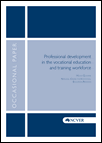Description
This paper explores a range of issues related to the development of the VET workforce. It examines key issues underpinning professional development structures and proposes a set of features integral to a comprehensive workforce development strategy. In particular it looks at the suitability of the Certificate IV in Training and Assessment, pathways to other educational qualifications, the feasibility of introducing a registration system for teachers and trainers, and potential changes to regulatory arrangements to help improve the take-up of professional development at provider level.
The original version of this paper was prepared for South Australia's Training and Skills Commission.
Summary
About the research
This paper is based on one prepared for South Australia's Training and Skills Commission. It comes at a time of strong interest in the quality and professionalism of the vocational education and training (VET) workforce. This interest is underpinned by research into what constitutes quality teaching, as well as initiatives such as the strategic audit of the Certificate IV in Training and Assessment under the auspices of the National Quality Council.
Guthrie argues that professional development is just one approach to improving the quality of the VET workforce. A strong professional culture in the workplace and better approaches to recruitment, job design, industrial relations, workplace and performance management also need to play their part. Whatever the approach, professional development needs adequate resourcing if it is to be effective.
Guthrie does not shy away from two areas surrounded by controversy—the Certificate IV in Training and Assessment and the registration of VET practitioners. On the former, Guthrie's view is that the certificate IV is a sound qualification as long as it is taught well and adequate support is provided. On the latter, he opposes mandatory registration but notes that under the Australian Quality Training Framework it is possible to audit so that providers not only have staff with the necessary qualifications and skills profile but also have an ongoing professional development program in place that helps the organisation run—and improve—its core business of teaching and learning. Perhaps these audit requirements should be particularly rigorous for providers issuing teaching qualifications.
Tom Karmel
Managing Director, NCVER
